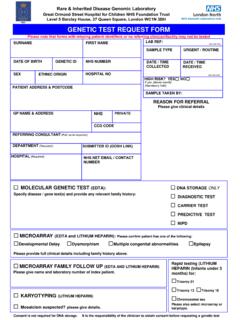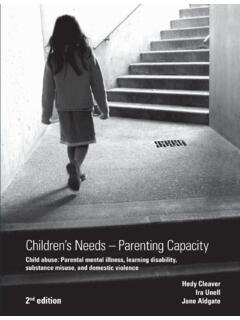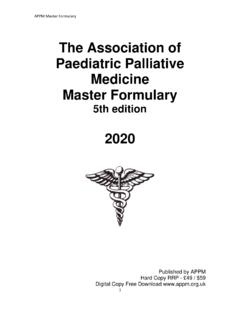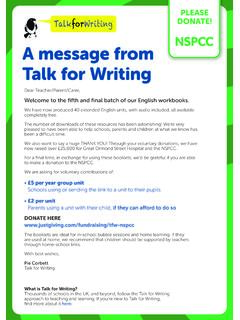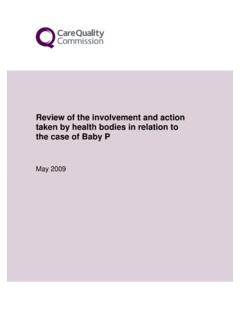Transcription of Sleep hygiene in children and young people: information ...
1 Sleep hygiene in children and young people : information for families This information sheet from great Ormond Street hospital (GOSH) explains about Sleep hygiene . The lead-up and routine around your child's bedtime is referred to as ' Sleep hygiene '. Having good Sleep hygiene can help your child both to settle to Sleep and to stay asleep. There are several things that parents can do to help here are some ideas of areas to consider. An Easy Read information sheet is included for your child. children of different ages require different Things to think about amounts of Sleep . The American Academy of Sleep Medicine (AASM) produced a 'Consensus Caffeine Statement in 2016 regarding recommended Good Sleep hygiene begins in the day, with the amount of Sleep for children and young people . consideration of your child's food and drink intake.
2 The table below gives an indication of the amount Caffeine is a stimulant that prevents Sleep , and of Sleep your child needs on a regular basis to can cause your child to stay awake for longer and keep them healthy. to settle to Sleep less easily. Caffeine is present in drinks such as tea, coffee, cola, energy drinks and Recommended Sleep Your child's age fizzy pop. If your child drinks these, try to limit their time in 24 hours intake and avoid them altogether after lunchtime. 12 to 16 hours including Infants 4 to 12 months Food naps 11 to 14 hours including Eating a large meal before bedtime can prevent children 1 to 2 years naps Sleep . Consider the best time to eat your dinner 10 to 13 hours including meal if your child has an early bedtime, ensure children 3 to 5 years that a large meal is not being eaten directly naps beforehand.
3 On school nights, it might be children 6 to 12 years 9 to 12 hours preferable for your child to eat earlier but you can Teenagers 13 to 18 still all have family meals at weekends and during 8 to 10 hours years holiday periods. However, some foods can be helpful in helping your child settle to Sleep for example, a drink of warm milk. Ref: 2020F1851 and 2020ER0367 GOSH NHS Foundation Trust, June 2020 Page 1 of 4. Exercise to calm down before sleeping. Going to the toilet as the last task before getting into bed can also children may have difficulty in falling asleep if they help prevent your child from needing to get up in have been inactive throughout the day. the night time. Encouraging your child, where possible, to undertake sports and to play outside can help to Technology burn off energy and enable your child to feel tired The use of electronic devices (such as televisions, at the end of the day.)
4 Even if your child is not very mobile phones and tablet computers) close to sporty', just going for a walk in the fresh air can bedtime can prevent your child from settling to be helpful. However, exercise should be avoided Sleep . This is because they produce light that is directly before bedtime, as the heat created by the good at suppressing natural hormones in the brain muscles by exercise can prevent your child falling that cause sleepiness. asleep. Environment Ideally, these devices should not be used in the hours before bed, and should be removed from Your child's sleeping environment should be a your child's bedroom in order to create an place where they feel safe and secure, but should environment that your child associates with Sleep . also be a place to Sleep and not play.
5 There are If your child uses these devices to help them fall several ways in which the sleeping environment asleep, consider replacing this routine with a can be adjusted, but it will depend on the needs of bedtime story or playing soothing music. your child (and any other children sharing the room). Self-settling For instance, some children may find the use of a If your child is routinely waking in the night, it is nightlight can make them feel safe others may important that they learn to self-settle rather than Sleep better in total darkness. Room temperature seeking a parent or joining a parent's bed. This and noise level should be adjusted, where can be difficult to enforce, and may be emotionally possible, to ensure your child is comfortable to fall challenging both for child and parent but asleep.
6 Parents should remain firm and assertive. Your child's bedroom should not contain things If your child leaves their bed and seeks you out at that distract them from sleeping if you find that night-time, you should try not to engage them in your child is being stimulated by toys, it may be conversation, but lead them quietly and best to remove these from the room before immediately back to bed. This may need to be bedtime, or to keep toys in a different area of the repeated several times each night, but it is house. important that your child learns that they will Routine receive the same response from you each time. If your child is anxious, the use of a night light, Having a bedtime routine and a set bedtime can cuddly toy or baby monitor may help them to feel help your child to understand what to expect and safe and to learn to self-settle.
7 How they should behave. A routine can start 30. minutes to two hours before bedtime, and can Praising your child in the morning for staying in include activities to help wind down, such as a bed at night can help reinforce good behaviour . warm bath/shower or reading a story. this can be aided by the use of a reward chart or stickers, with a small token prize when a certain Sticking to a set pattern each night will help your number of stickers/rewards have been won. child to settle before bed and give them the time Ref: 2020F1851 and 2020ER0367 GOSH NHS Foundation Trust, June 2020 Page 2 of 4. Further information and support The children 's Sleep Charity offers advice to anyone whose child is not sleeping well. Call them on 01302. 751 416 or Contact (previously known as Contact a Family) also provides information , particularly for children with disabilities.
8 See their booklet on Sleep at child- Sleep /. Getting a good night's Sleep Sleep is very important. It lets your body and mind rest after a busy day. Everyone has trouble sleeping sometimes. There are things you can do to help you Sleep better. Think about what you eat and drink in the afternoons and evenings. Cola drinks have something in them to keep you awake. Try not to eat too much before bedtime. Have a least an hour after dinner to let your food go down. Try to get some fresh air each day. You don't have to do a sport every day. Just going outside is good. Try not to have where you Sleep too hot or too cold. Put a nightlight on if you like to have some light or dark curtains if you don't. Try to go to bed at the same time each day. This should be the same at weekends as well as on school nights.
9 Ref: 2020F1851 and 2020ER0367 GOSH NHS Foundation Trust, June 2020 Page 3 of 4. Have a warm bath or shower before bed to relax you. You could also have a milky drink as this could help you Sleep . Don't watch the television or use your phone or tablet before bed. The light they give off can wake up your brain. Remember to go to the toilet before you go to bed. Ref: 2020F1851 and 2020ER0367 GOSH NHS Foundation Trust, June 2020 Page 4 of 4.



